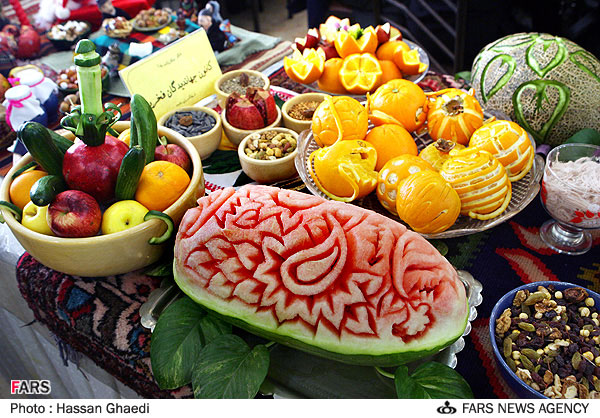The occasion of Shab-e Chelleh is an Iranian observation held from the ancient times. It is simultaneous with the winter solstice when the sun appears at noon at its lowest altitude. It is traditionally believed that people must spend the night by preparing and consuming special foods for the night is the longest of the year.
The night is the turning point in the cold/warm or darkness/light balance, after which the days start to grow longer as spring draws on. The night is the occasion of the victory of light over darkness and the starting point for anticipations of good, warm days.
Derived from a pre-Zoroastrian festival, Shab-e Chelleh is celebrated on the eve of the first day of winter in the Persian calendar, which always falls on the solstice. Yalda is the most important non-new-year Iranian festival in modern-day Iran and it has been long celebrated in Iran by all ethnic/religious groups. According to Iranian mythology, Mithra was born at the end of this night after the long-expected defeat of darkness against light. Shab-e Chelleh is now an important social occasion, when family and friends get together for fun and merriment. Usually families gather at their elders' homes. Different kinds of dried fruits, nuts, seeds and fresh winter fruits are consumed. The presence of dried and fresh fruits is reminiscence of the ancient feasts to celebrate and pray to the deities to ensure the protection of the winter crops.

Shab-e Chelleh table in traditional setting
Watermelons, persimmons and pomegranates are traditional symbols of this celebration, all representing the sun. It used to be customary to stay awake Yalda night until sunrise eating, drinking, listening to stories and poems, but this is no longer very common as most people have things to do on the next day.
During the early Roman Empire many Syrian Christians fled from persecution into the Sassanid Empire of Iran, introducing the term Yaldā, meaning "birth", causingShab-e Yaldā to become synonymous with Shab-e Chelleh. Although both terms are used interchangeably, Chelleh is more commonly accepted for this occasion.
Iranians have special preparations for the night and these vary from one part of the country to another. The things prepared usually include fruits such as watermelon, pomegranate, and other fruits available at the time like orange. Also, some special food is prepared. The main food usually includes turkey or goose. There are also snacks prepared especially by people from the western part of the country which usually come in the form of a big bowl filled with fried wheat _ which has been previously laid in milk with some spice and then dried _ and some other nuts plus raisin.


